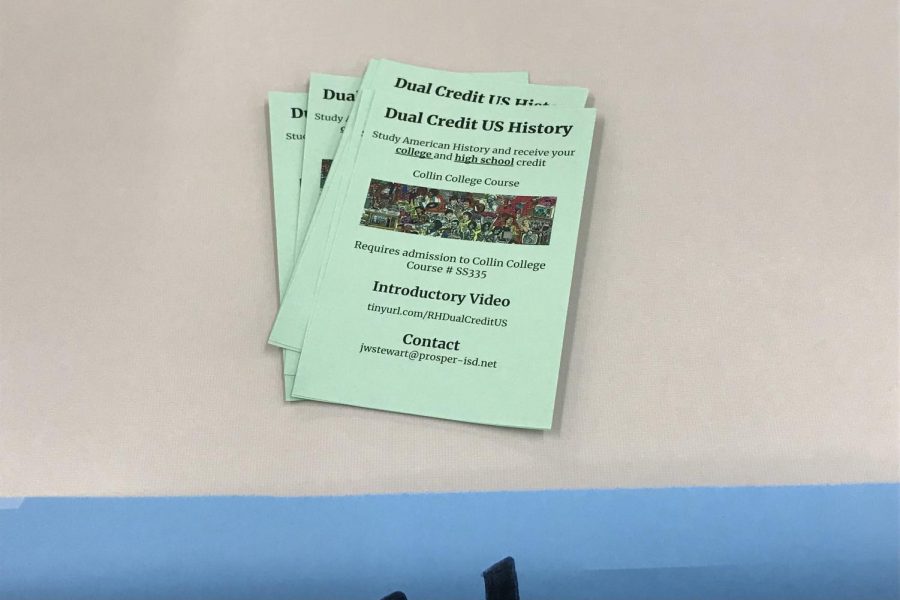Students evaluate Dual Credit courses while considering new schedules
January 21, 2022
Almost a month into the second semester, discussions about courses for the next academic year have started. Counselors have been eager to educate students and parents on options and scopes, incorporating interests whether the student is looking into health science or armed services. Though students can mull over typical course selections for a month longer, Dual Credit requires an early review to consider admission requirements, payment, and applications.
“It seems daunting to many students,” college and career counselor Alicia Schulze said. Schulze helps students navigate the DC process. “It should be intimidating in a good way in that it’s a challenge to help students grow and build their confidence, knowing that you can handle college classes and admission processes.”
This year, additions to the district’s DC offerings are science classes for non-science majors, i.e., biology, chemistry that are required for most students. In addition, the DC options can often extend its array, offering students a comprehensive range of options to get college credit while meeting high school requirements.
“I plan on taking Dual Credit Health Science next year,” junior Yasmin Garada said. “I want to study something medical in college, and this will help me get an initial experience at a lower cost. I might also take Dual Credit English though I’m in AP this year, just to try out the available options.”
Advanced Placement classes can also fulfill the goal of getting college credit, and students usually weigh the advantages and constraints between AP and DC choices. AP classes are taught on the school campus, but students can also take DC courses on premises like Collin College. Even course material differs from AP to DC in the same subject.
“Different kids find that [either AP or DC] fits their skills better,” DC US history teacher Jarred Stewart said. “Dual Credit is a nice entry point to where there’s perhaps not as great of a gap from a regular academic class to a college-level class; in AP, the learning curve can be a little bit steeper, whereas, with dual credit, it’s not quite as steep.”
For DC, college credit is granted at passing the course, which is a deviation from AP’s end-of-course examinations that determine whether students get the credit. Students who plan to study out-of-state might choose AP since credit would be variably accepted at nationwide colleges, while DC guarantees credit in all Texas public colleges. For Schulze and Garada, a mix of both pathways is best.
“AP offers classes that dual credit doesn’t, and Dual Credit offers different opportunities,” Schulze said. “You can’t take Dual Credit calculus, and you can’t take psychology. So if you take Dual Credit for English, history, government and AP maybe for math, social sciences and environmental science, you kind of cover all of your college requirement basics.”
DC has testing requirements for admittance- a TSI test offered at no cost for the next month. The test checks readiness for a college-level course but can be waived for students with above certain PSAT or STAAR scores. Though the test costs about $30, the two-semester course selections cost a significant amount, usually around $100 more than AP tests. However, scholarships and grants are available, and Schulze can help students find those.
“Even though the cost is a factor, I’d rather pay now for a class I have to take rather than a much higher amount in college,” Garada said. “I understand that some students might hesitate because of it, but I think while considering its worth, later on, its benefit definitely adds up.”
If students can secure college credit, though, it helps them save money, later on, having opted for DC rather than the traditional university course. On the other hand, if students don’t feel secure relying on AP tests for credit, DC might be a less stressful option to consider. The district wants to make sure students thoroughly understand their options through events and emails.
“Many people don’t take Dual Credit simply because it is not known as much yet,” Stewart said, “It’s something that’s relatively new to school districts. There are probably a lot of kids out there that could take Dual Credit but need to hear more about it understand what it is. This even goes for AP. [Students] just didn’t know that they could take it or that it’s even really an option for them.”
Even if college credit isn’t the main goal for students, taking DC has other incentives. It gives students experience in college-level academics and thus shows readiness for similar courses after graduation. DC participants also become Collin College students, including access to libraries and online databases that would not have been accessible otherwise.
“Dual Credit [can also be taken by] students who don’t necessarily want to go the traditional college route, if they plan for a technical program in welding, let’s say,” Schulze said. “A lot of those degree programs will still have English, math and social science in their curriculum so that you can get those credits out of the way now. If you want more of a route that doesn’t include traditional college classes, it’s still something for skills or to have in your back pocket if you decide to [take college classes] later on.”








